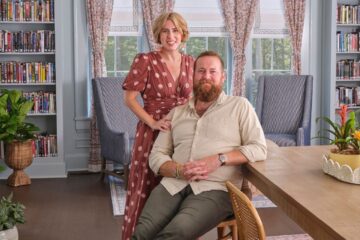Valerie Bertinelli’s raw and reflective message about heartbreak, growth, and self-worth is more than just a personal confession—it’s a powerful reminder that pain doesn’t define us, but what we learn from it can. In her deeply honest words, Bertinelli explores the hard truths of relationships, healing, and emotional growth, not from a place of self-pity, but from a place of earned wisdom.
“This is not to say I feel sorry for myself because I don’t. Nobody has the market cornered on grief and heartache. People go through hard sh– all the time. You just do what you have to do to get through what you have to get through,” she said.
These words don’t minimize pain—they normalize it. Bertinelli doesn’t claim her struggles are bigger than anyone else’s. Instead, she reminds us that grief and hardship are universal experiences.

Everyone has their share, and no one gets a pass. But she doesn’t stop there. She leans into the emotional work that follows hardship.
“And I don’t know that I would change any of it. I’ve learned so much more about my strength, my weaknesses, my patience, my resilience, and my worth. I still have more inner work left to do.”
This admission isn’t about romanticizing pain—it’s about honoring the transformation it can bring. It’s a nod to the personal growth that comes from enduring hardship without letting it destroy who you are. She’s honest that the work isn’t over—healing isn’t linear, and there’s no final destination. There’s always more to uncover about ourselves.
Bertinelli also offers a piece of advice to anyone who might be standing in the same emotional space she once stood in.
“If I could give you anything of value from my experience it would be this; don’t let the challenging days make you forget how far you’ve actually come. No matter what, always believe in your core self. Do not allow the opinions of others or their experience with you, color what you think of yourself. You did your best with what you knew at the time.”
That’s a grounding message for anyone grappling with regret or self-doubt. Often, when things fall apart, we second-guess everything. But she’s encouraging her followers to honor their effort, even if the outcome wasn’t what they hoped for. Growth often happens quietly, beneath the surface, and recognizing that is key.
“Betrayal of your own self-worth is even worse than another’s betrayal. You deserve kindness, respect, and confidence that can be trusted. Especially and mostly from yourself. We’re here on this little floating rock to learn and to love. Learn to love yourself. Even that damn shadow.”
In this statement, she redefines betrayal—not as something that others do to us, but something we can do to ourselves when we lose sight of our value. That concept hits hard. We often worry about others hurting us, but how often do we neglect the kindness we owe ourselves? Self-love isn’t just a buzzword here; it’s survival.
“And if/when we fall or get pushed down again, we can either wallow, navel-gaze and be a victim or we can get our asses back up and live our big, beautiful life. Do that.”
It’s a wake-up call wrapped in tough love. Pain is inevitable, but staying stuck in it is a choice. Bertinelli encourages her followers to feel what they need to feel but then rise—to move forward, stronger, clearer, and more alive.
In February, she revealed how her recent breakup with ex-boyfriend Mike Goodnough had stirred deeper reflections about relationships and communication. Her message wasn’t bitter—it was honest.
“When you feel hurt and wronged and know you deserve an apology but are being stonewalled by your partner because they’re feeling shame, maybe this can shift your thinking. How are you bringing it up? Are you only pointing out what they’re doing wrong, being hypercritical, and expecting them to just fix it? That could be making things worse. Change, real change, never happens through criticism, shame, or pressure. They most likely already feel all that. (I know when I f— up, oof, do I feel shame).”
Here, Bertinelli gets vulnerable. She doesn’t defend toxic behavior, but she looks at both sides. She unpacks the trap of conflict—the way defensiveness and shame shut people down—and suggests that a softer, more human approach might help.
“When feeling attacked, a natural reaction is to shut down and get defensive and feel overwhelmed about changing behavior that may be a coping mechanism since childhood. They’ll feel judged and feel like they can’t get anything right and they won’t really hear you.”
This speaks to emotional intelligence and the importance of understanding not just actions, but the roots behind them. She gently challenges her readers to shift from blame to curiosity.
“If you stop focusing on what they did wrong and instead approach with empathy and understanding, everything can then start to shift. Instead of saying, ‘You always do this!’ Maybe try, ‘This is how I feel when this happens, can we figure this out together?’ That one small change can make a difference.”
This isn’t about excusing harmful behavior—it’s about creating space for real communication. Bertinelli highlights the power of language to open or close doors in a relationship.
“And hello, I’m not saying this is easy when you’ve been hurt and you want to lash out in anger (which is fear and/or grief and probably some of your own hidden childhood triggers). BUT, doing it differently may give you a better chance at getting the apology and amends that you deserve.”
That’s the heart of her message: you can demand respect without giving up compassion. You can hold someone accountable and still be gentle. And, perhaps most importantly, it takes both people showing up for the relationship to truly heal.
“Looking for ways to show up for each other is a love language and it takes two to do it. Even when you feel wronged and think they should just know and do better. I think we all just want to do better and feel awful when we’ve hurt someone we love and shame prevents us from thinking clearly. Wouldn’t it be nice to relieve the one you love from shame so they can truly give you the amends you’re looking for?”
She ends on a self-aware note:
“Then again, what do I know? I have two failed marriages and fumbled the last true good man I met. Maybe don’t take advice from me.”
But that’s exactly why her words do matter. She’s not preaching from a perfect place—she’s sharing hard-earned wisdom from lived experience. And sometimes, that’s the most honest kind of guidance there is.



0 Comments